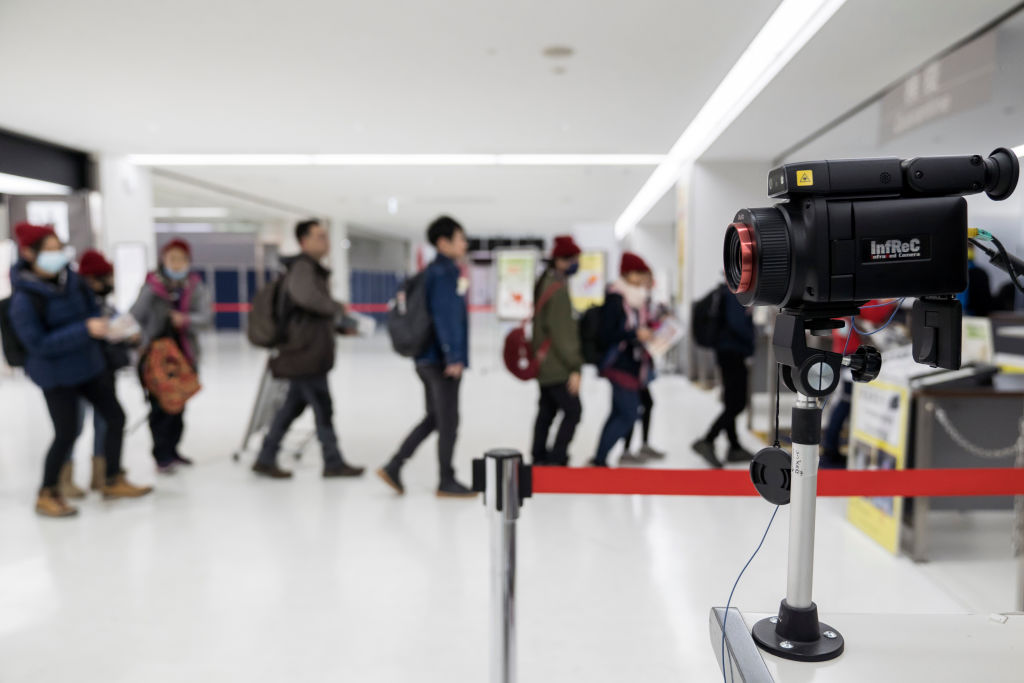
Days after officials from the U.S. Centers for Disease Control and Prevention (CDC) announced that all travelers from Wuhan, China would be “funnel[ed]” through one of five U.S. airports to be screened for a novel coronavirus, representatives from the agency said the plan is still in the process of being implemented—and it’s unclear exactly when it will be, a process complicated by a quarantine in Wuhan put in place by the Chinese government.
On a Jan. 21 call with reporters, Dr. Martin Cetron, director of the CDC’s division of global migration and quarantine, said all U.S.-bound passengers from Wuhan would be funneled through one of five domestic airports—New York City’s John F. Kennedy International Airport, Los Angeles International Airport, San Francisco International Airport, Chicago O’Hare International Airport and Hartsfield-Jackson Atlanta International Airport—equipped to screen for the coronavirus, which is spreading around Asia and was this week confirmed in the U.S.. Cetron called the system a “full-on, 100% coverage strategy” that “involves reissuing tickets and rerouting passengers from all over the globe through connecting and direct flights.”
On Jan. 23, a representative from the CDC’s preparedness and response division told TIME that those airports are, indeed, screening passengers who may have contracted coronavirus while abroad. Flights into the U.S. are not yet being rerouted to ensure that travelers pass through one of them, though implementation is “imminent,” according to an agency representative.
CDC spokespeople said the agency is working with U.S. Customs and Border Protection (CBP) to finalize travel funneling and screening plans. CBP and the U.S. Department of Transportation, meanwhile, directed TIME back to the CDC for comment.
The CDC representative said most passengers flying from Wuhan would likely travel through the five selected airports anyway. Plus, since travel has been all but halted in and out of Wuhan, the number of affected flights will be dramatically reduced for the time being.
Officials at the five U.S. airports set up for advanced screening will escort travelers who have been in Wuhan to an area where they will fill out a form that details their travel, health status and contact information, according to a CDC spokesperson. From there, CDC staff will look for signs of illness and take each person’s temperature. Symptom-free travelers will be released and given an information card they can give to health providers if symptoms develop later, while people who have a fever, cough or difficulty breathing will be further examined by a CDC officer. Those at high risk of having contracted coronavirus will be transported to a nearby hospital for further assessment, including blood testing.
Representatives from the Los Angeles, San Francisco, Chicago and Atlanta airports said they did not expect flight or other disruptions in light of the screenings. TIME could not reach a representative from New York’s JFK airport for comment.
Other U.S. airports that are not fully set up for screenings know to give passengers who may be at risk information about coronavirus, the CDC says. “If an individual is ill, CDC will receive a call,” a spokesperson said. “These operations go on each and every day.”
While the CDC’s flight rerouting is still in progress, the Wuhan coronavirus has inspired precautions at airports across the globe. Restrictions in Wuhan—a travel hub with a population of about 11 million—days before Lunar New Year are particularly dramatic; the CDC representative called them “unprecedented in recent times.”
Public-health agencies, including the CDC and the World Health Organization, often balk at extreme travel restrictions, fearing they stigmatize those who are ill and drive movements underground. During a West African Ebola outbreak lasting from 2014 to 2016, however, the CDC did funnel travelers from Sierra Leone through certain domestic airports for screening.
This story has been updated to reflect clarified information from the CDC.
More Must-Reads from TIME
- Cybersecurity Experts Are Sounding the Alarm on DOGE
- Meet the 2025 Women of the Year
- The Harsh Truth About Disability Inclusion
- Why Do More Young Adults Have Cancer?
- Colman Domingo Leads With Radical Love
- How to Get Better at Doing Things Alone
- Michelle Zauner Stares Down the Darkness
Write to Jamie Ducharme at jamie.ducharme@time.com